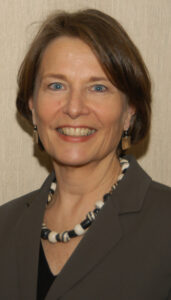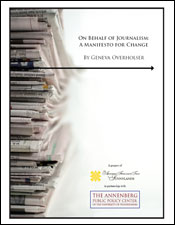Journalism’s Future: A “Panorama of Possibilities,” Concludes Overholser in New Study
Philadelphia, Pa. (Oct. 12, 2006) — Journalism will survive only if it adapts to the times, writes Geneva Overholser in a new report titled “On Behalf of Journalism: A Manifesto for Change.” The report is being released today by the Annenberg Public Policy Center of the University of Pennsylvania.

“The story of American journalism is undergoing a dramatic rewrite,” says Overholser, a nationally known reporter and editor who formerly worked for The New York Times, the Washington Post and the Des Moines Register before joining the faculty of the Missouri School of Journalism. “The pace of change makes many anxious, and denunciations are lobbed from all sides – and from within. It’s easy to overlook the promise of the many possibilities that lie before us.”
Overholser holds the Curtis B. Hurley Chair in Public Affairs Reporting at the School and works out of its Washington, D.C. bureau at the National Press Club.
The Overholser report, a project of the Annenberg Foundation Trust at Sunnylands, in partnership with the Annenberg Public Policy Center, is the result of more than a year’s worth of research and interviews. The project grew out of a June 2005 conference in Philadelphia that brought together 40 journalists, scholars and news executives to discuss the role of the press in a democracy and what might be done to enhance it.

In the process, topics such as the growing financial pressures on newspapers, the benefits of public vs. private ownership, credentialing of journalists, the role of government in a free press and new forms of media were discussed. At the conclusion of the conference, Overholser conducted additional analysis of media problems and potential solutions before writing the report.
She also created a list of “action steps” – recommendations designed to keep the nation’s media vigorous and independent, while recognizing a dramatically different information landscape.
“We are not lacking for ways to deliver information,” Overholser concludes. “What we are lacking, increasingly, is the particular kind of information that keeps free people free…The first step toward solving this challenge is understanding its magnitude. Then will come necessary actions from many different constituencies. We intend to pursue these solutions vigorously, in the fine company of others working on behalf of journalism.”
Updated: April 13, 2020